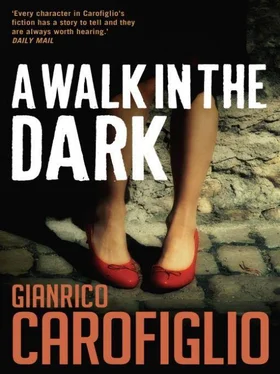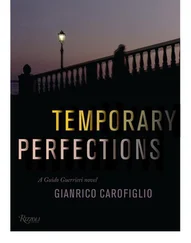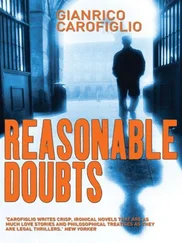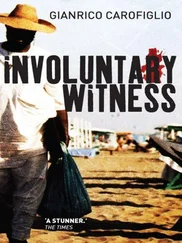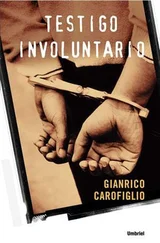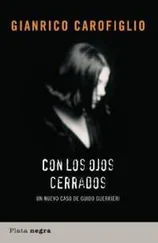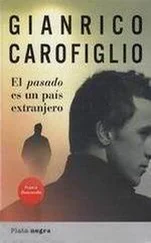Gianrico Carofiglio - A Walk in the Dark
Здесь есть возможность читать онлайн «Gianrico Carofiglio - A Walk in the Dark» весь текст электронной книги совершенно бесплатно (целиком полную версию без сокращений). В некоторых случаях можно слушать аудио, скачать через торрент в формате fb2 и присутствует краткое содержание. Жанр: Криминальный детектив, на английском языке. Описание произведения, (предисловие) а так же отзывы посетителей доступны на портале библиотеки ЛибКат.
- Название:A Walk in the Dark
- Автор:
- Жанр:
- Год:неизвестен
- ISBN:нет данных
- Рейтинг книги:5 / 5. Голосов: 1
-
Избранное:Добавить в избранное
- Отзывы:
-
Ваша оценка:
- 100
- 1
- 2
- 3
- 4
- 5
A Walk in the Dark: краткое содержание, описание и аннотация
Предлагаем к чтению аннотацию, описание, краткое содержание или предисловие (зависит от того, что написал сам автор книги «A Walk in the Dark»). Если вы не нашли необходимую информацию о книге — напишите в комментариях, мы постараемся отыскать её.
A Walk in the Dark — читать онлайн бесплатно полную книгу (весь текст) целиком
Ниже представлен текст книги, разбитый по страницам. Система сохранения места последней прочитанной страницы, позволяет с удобством читать онлайн бесплатно книгу «A Walk in the Dark», без необходимости каждый раз заново искать на чём Вы остановились. Поставьте закладку, и сможете в любой момент перейти на страницу, на которой закончили чтение.
Интервал:
Закладка:
“It’s just that I find it difficult to trust people. Even those who are on the right side. It’s a problem of mine.”
“I try to get rid of my aggression with my fists.” The words just came out, and immediately I’d said them I realized she might take them the wrong way. “I mean I do a bit of boxing. It helps, I think. Like martial arts.”
Claudia looked up, slightly surprised. “Strange.”
“Why?”
“I teach Chinese boxing.”
Well, that was a turn-up for the books.
“Chinese boxing? You mean kung fu?”
“The expression ‘kung fu’ doesn’t mean anything. Or rather it means a lot of things, but doesn’t describe any martial art in particular. Roughly translated, kung fu means hard work.”
The conversation was slightly surreal. We’d gone from Martina’s psychiatric problems to martial arts and Chinese philosophy, with a bit of philology thrown in.
I asked Sister Claudia what kind of Chinese boxing she taught. She told me it was a discipline called wing tsun, which according to legend had been developed in China by a young nun in the sixteenth century. Sister Claudia gave lessons twice a week, in a gym where they did dance and yoga.
I said I’d like to watch one of her lessons. She looked straight at me for a moment – as if to make sure I was serious and not just making conversation – and said she’d invite me along some time.
We’d reached the end of our conversation. So I made a rather clumsy gesture of farewell with my hand, got in my car and started it, while she went and opened the gate to let me out.
Moving away slowly along the dirt road, I looked in the rear-view mirror. Sister Claudia had not gone inside yet. She was standing next to the gatepost and seemed to be watching as my car drew away.
Or maybe she was watching something else, in some place I didn’t know and couldn’t even imagine. There was something in the way she stood there, alone, against the background of that solitary, unreal landscape, which gave me a sudden twinge of sadness.
After ten minutes spent in a kind of semi-consciousness, I found myself on an asphalt road, back in the outside world.
14
The following morning I had a trial in Lecce. So I got up early and after a shower and a shave put on one of the serious suits I wore whenever I was working out of town. Wearing a serious suit, usually dark grey, was a habit I’d adopted when I was a very young lawyer. I’d passed my exams at the age of twenty-five, when I still looked like a first-year college student. To look like a real lawyer I had to become older, I thought, and a dark grey suit was perfect for that.
As the years passed, the grey uniform stopped being essential. People knew me in Bari, and besides, as the years passed, I have to admit I looked less and less like a first-year student.
By the time I turned forty, I only put on a grey suit when I went out of town. To make it clear, in places where I wasn’t known, that I really was a lawyer. A concept I still secretly had doubts about myself.
Anyway, I put on a grey suit, a blue shirt, a regimental tie, picked up the briefcase I’d brought home from the office the previous evening, left a cup of coffee on Margherita’s bedside table, and went out. Margherita was still asleep, breathing peacefully but resolutely.
I’d reached the garage and was just about to get in my car when my mobile rang.
It was my colleague from Lecce, who’d got me involved in that case. He told me that the judge who was dealing with it was ill, which meant that the trial was going to be postponed. So there was no point in my going all the way to Lecce just to hear the order for the postponement. I agreed, there was no point. But how had he found out, at seven-thirty in the morning, that the judge was ill? Oh, he’d known since the day before, but it had been a very heavy day and he’d forgotten to tell me. Bravo. But he would tell me the new date for the trial. Oh, thanks, very kind of you. Bye then. OK, bye. And fuck you.
I don’t generally like to get up early in the morning if it isn’t absolutely necessary. If I want to see the dawn – it sometimes happens – I’d rather stay up all night and then go to sleep in the morning. Not easy to do, when you’ve got work the next day. Waking up early – having to wake up early – makes me quite nervous.
That morning, I’d woken up early because of my colleague from Lecce. So now I found myself adrift in the city on a lovely November morning. Without anything to do, since I’d supposed the whole day would be devoted to that out-of-town trial which had been adjourned.
Obviously, in a while I’d start to feel anxious and end up in my office going through papers that weren’t urgent and making phone calls that weren’t necessary. I knew that perfectly well. I know all about anxiety. Sometimes I’m even wise to its tricks and manage to beat it.
Most of the time, it wins and makes me do stupid things, even though I know perfectly well that they are stupid things. Like going to the office on a day when I could go somewhere else and read a book, listen to a record, see a film in one of those cinemas where they have morning shows.
So I would go to my office, but it wasn’t eight yet: too early to get sucked back into the vortex of the work ethic. So I thought I’d take a stroll, maybe as far as the sea. I could have breakfast in one of those bars I liked on the seafront.
I could have a nice smoke.
No, not that.
Stupid idea to quit smoking, I thought as I headed towards the Corso Vittorio Emmanuele.
I’d almost reached the ruins of the Teatro Margherita, which was endlessly in the process of restoration, when I saw a vaguely familiar face coming towards me. I screwed up my eyes – I never wore glasses except to go to the cinema or to drive a car – and saw that the man was giving me a kind of smile and raising his arm to greet me.
“Guido!”
“Emilio?”
Emilio Ranieri. We hadn’t seen each other for fifteen years. Maybe more. We came level with each other, and after a moment’s hesitation he embraced me. After another moment’s hesitation I responded to his embrace.
Emilio Ranieri had been my classmate at secondary school, and then we’d been at university together for two or three years. He’d quit before graduating, to become a journalist. He’d started out at a radio station in Tuscany and then was hired by L’Unita, where he’d stayed until the paper shut down.
Every now and again I’d hear something about him from mutual friends, though less and less as the years went by. In the mythical period of my life that straddled the end of the Seventies and the beginning of the Eighties, Emilio had been one of my very few real friends. Then he’d vanished, and in a way I’d vanished too.
“Guido. How nice to see you. Damn it, you’re just the same, except for a bit less hair.”
He wasn’t the same. He still had all his hair but it was completely white. There were lines at the corners of his eyes that looked as if they’d been carved in leather: harsh and painful, they seemed to me. Even his smile looked different somehow. There was something scared, defeated, about it.
But it was nice to see him. In fact, I was really pleased. My friend Emilio.
“Yes, it is nice to see you. What are you doing in Bari?”
“I work here now.”
“What do you mean: you work here?”
“I was unemployed after they closed L’Unita. Then I heard they were looking for people here in Bari to join the editorial staff of ANSA, so I applied and they hired me. The way things are these days, I think I was lucky.”
“You mean you’re back here for good?”
“If they don’t throw me out. Not impossible, but I’ll try to behave.”
Читать дальшеИнтервал:
Закладка:
Похожие книги на «A Walk in the Dark»
Представляем Вашему вниманию похожие книги на «A Walk in the Dark» списком для выбора. Мы отобрали схожую по названию и смыслу литературу в надежде предоставить читателям больше вариантов отыскать новые, интересные, ещё непрочитанные произведения.
Обсуждение, отзывы о книге «A Walk in the Dark» и просто собственные мнения читателей. Оставьте ваши комментарии, напишите, что Вы думаете о произведении, его смысле или главных героях. Укажите что конкретно понравилось, а что нет, и почему Вы так считаете.
